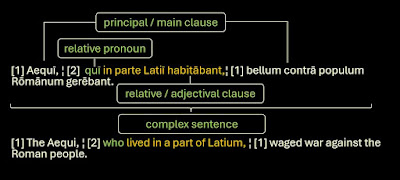Image #1
[1] Yesterday I
bought a new car [2] which was very expensive.
“which was very
expensive” is also a subordinate clause; it too cannot stand alone. However,
clauses that are introduced by ‘who’, ‘which’ or ‘that’ are called relative
clauses or adjectival clauses because they give
additional information about a person or a thing in the main / principal
clause. More will be done on this in later posts. What matters here is to
become familiar with the terms used when this clause type is being discussed.
[1] Yesterday I
bought a new car [principal / main clause] ¦ [2] which was
very expensive [relative clause].
The words ‘who /
which / that’ are all used in English as relative pronouns, the
word that refers to the person or thing in the main clause. There is a lot more
to that which will be discussed in later posts. The main aim here is to become
familiar with the terms used.
1. The girl who is
crying caused the problem herself.
2. Yesterday I
bought a car which was very expensive.
3. The dog that’s
been barking all night is getting on my nerves.
Image #2
In Latin, those
English relative pronouns are all expressed by quī, quae and quod.
Image #3: antecedent
The term
‘antecedent’ refers to the person(s) or thing(s) to which the relative pronoun
refers.
I bought a
new car ¦ whichwas very expensive.
The film ¦ that you’re
watching ¦ looks interesting.
I saw a man ¦ who was
acting suspiciously.
[1] Aequī [antecedent]
¦ [2] quī [relative pronoun] in parte Latiī habitābant, [1]
bellum contrā populum Rōmānum gerēbant. [principal clause].
- [1] The Aequi, ¦ [2] who lived in a part of Latium, ¦ [1] were waging war against the Roman people.
[1] Equum [antecedent]
magnum et ligneum aedificant, ¦ [2] quem [relative pronoun]
virīs complent.
- [1] They build a large and wooden horse ¦ [2] which they fill with men.



No comments:
Post a Comment